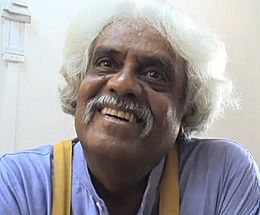A. Ramachandran facts for kids
Quick facts for kids
A. Ramachandran
|
|
|---|---|

Ramachandran in 2012
|
|
| Honorary Chairman of Kerala Lalithakala Akademi |
|
| In office 1991–? |
|
| Personal details | |
| Born |
Achutan Ramachandran Nair
1935 Attingal, Travancore, India |
| Died | (aged 89) New Delhi, India |
| Citizenship | Indian |
| Nationality | Malayali |
| Spouse | Tan Yuan Chameli |
| Relations | Tan Yun-Shan (father-in-law) |
| Residences | New Delhi, India |
| Education | MA (in Malayalam literature) PhD (in Kerala mural painting) |
| Alma mater | Kala Bhavan |
| Profession | painter |
| Awards | Noma Concours (twice) |
Achutan Ramachandran Nair, known to many as A. Ramachandran (born 1935 – died 10 February 2024), was a famous Indian painter. He was born in a place called Attingal, in Kerala, India. Ramachandran was recognized for his amazing art. In 2002, he became a special member of the Lalit Kala Akademi, which is a big art organization in India. Later, in 2005, he received the Padma Bhushan award. This is one of India's highest awards given to people who do great things for the country. In 2013, he also received an honorary doctorate degree from Mahatma Gandhi University, Kerala for his contributions to art.
Contents
Becoming an Artist
A. Ramachandran loved art from a young age. Even though he earned a master's degree in Malayalam literature in 1957, his passion for art never faded. He decided to follow his dream and joined Kala Bhavan in Santiniketan.
Learning from Masters
At Kala Bhavan, he studied art from 1957 to 1961. He learned from very famous artists like Ramkinkar Baij and Benode Behari Mukherjee. These teachers greatly influenced his artistic journey. After finishing his art education, he spent time studying Kerala mural painting. He even wrote a special research paper about these traditional paintings between 1961 and 1964.
Teaching Art
In the mid-1960s, Ramachandran moved to New Delhi. In 1965, he started working at Jamia Millia Islamia university. He taught art education there. He later became a professor and worked at the university until 1992. In 1991, he was chosen to be the honorary chairman of the Kerala Lalithakala Akademi. This is an important art academy in Kerala. In 2005, he became a Professor Emeritus at Jamia Millia Islamia University. This means he was given a special title for his long and important service.
Ramachandran lived and worked in New Delhi for most of his life. He was married to an artist named Tan Yuan Chameli.
Ramachandran's Art Style
Ramachandran's art changed over time. At first, he painted in a style called "expressionist." His early paintings were large and showed the feelings of city life. They often featured strong human figures.
A New Direction
By the 1980s, his art took a new turn. He became very interested in a tribal community in Rajasthan. Their lively culture and way of life inspired him. He also started to use the bright colors and shapes found in the old Kerala temple murals. Myths and ancient stories became a big source of ideas for his paintings.
The 'Yayati' Series
One of his most famous works in this new style was called 'Yayati'. This art piece told a story from the ancient Indian epic, the Mahabharata. He designed it to look like the inside of a Kerala temple. It included thirteen bronze sculptures. These sculptures were surrounded by huge painted murals. The murals were 60 feet long and 8 feet high!
His Unique Touch
Ramachandran was very skilled with lines, colors, and shapes. His paintings often felt full of life and energy. He also added a bit of humor and surprise to his art. This made his paintings interesting and fresh. He also created sculptures. Many people found his sculptures even more fascinating than his paintings.
Public Artworks
In 2003, he designed a large granite sculpture. It was a bas-relief, which means it was carved into a flat surface. This sculpture is at the Rajiv Gandhi Memorial in Sriperumbudur, near Chennai. It is very big, stretching 125 feet long and nearly 20 feet high.
Books and Writings
Ramachandran was not just a painter; he also wrote books and articles.
Art Books
In 2003, the National Gallery of Modern Art in New Delhi held a big show of his work. A two-volume book was released at the same time. It was called 'A Ramachandran: A Retrospective'. This book showed and explained many of his artworks.
Ramachandran also wrote a detailed study about the murals in Kerala temples. This book was titled 'Abode of Gods: Mural Traditions of Kerala'. He wrote many articles in English too. These articles were translated into several languages, including Japanese and his native language, Malayalam. A collection of his Malayalam articles, Aannottam, was published recently. He also published a couple of other books in Malayalam.
Children's Books
Ramachandran also wrote and drew pictures for many children's picture books. These books were published in India, Japan, Britain, and the United States. He won the Noma Concours Awards twice for his children's books, in 1978 and 1980. Some of his original drawings from these books are kept permanently at the Museum of Children's Books in Miyazaki, Japan.
Books and Documentaries About A. Ramachandran
- Ramachandran: Art of the Muralist, by Rupika Chawla, 1994
- Ramachandran, Icons of the Raw Earth, by Rupika Chawla, 1998
- The Art of A Ramachandran, by Ella Dutta, 2000
- Ramachandrante Kala (in Malayalam), by P. Surendran, 2001. This book won an award from the Kerala Lalita Kala Akademi.
- A Ramachandran: A Retrospective, by R. Siva Kumar, 2003 (two volumes)
- World of the Lotus Pond, a documentary film by K. Vikram Singh, 2004
 | Victor J. Glover |
 | Yvonne Cagle |
 | Jeanette Epps |
 | Bernard A. Harris Jr. |

